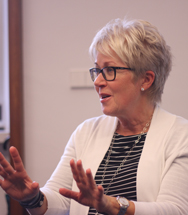To deepen the qualitative research to improve the attention and care of patients with advanced and terminal illnesses.
The ATLANTES program of the ICS organizes a qualitative research course for healthcare professionals.

The ATLANTES program of Institute for Culture and Society (ICS), in partnership with the School of Nursing of the University of Navarra and the School of Health and development Social of the School of Nursing of the University of British Columbia of Canada, organizes a course of research qualitative directed to health professionals on March 10, 11 and 12.
The course focuses on the qualitative analysis of data with the goal to initiate health professionals in this subject analysis, in addition to reviewing the basic principles and premises of qualitative research , studying the main designs of research (ethnography, phenomenology, narrative and grounded theory), knowing the main methods of data analysis and developing the necessary skills to perform these programs of study.
Speakers include Carole Robinson, professor at the University of British Columbia School of Nursing in Canada; Olga López de Dicastillo, professor at School of Nursing at the University of Navarra; and José Miguel Carrasco and María Arantzamendi, researchers in the ATLANTES Program at Institute for Culture and Society.
Understanding the personThe qualitative research provides a way of approaching reality from the individual perspective and a closer view of human beings, taking into account the contexts in which people live and how their personal experiences influence their lives and behavior.
Understanding the motivations of a person with an advanced and terminal illness, his or her goals in life, values, feelings, beliefs and preferences is essential for health care professionals in order to be able to develop their work effectively. It is important to know the experiences of the different people involved in this final phase of life (patients, family members and healthcare professionals) in order to improve the care and accompaniment of patients in this status.
More information: http://www.unav.edu/web/high school-culture-and-society/project-atlantes/qualitative-data-analysis-2016
